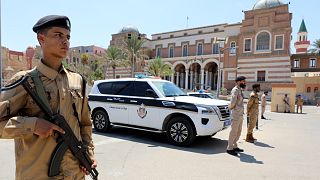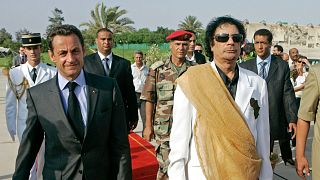Libya
Libya's principal eastern city may be best known as the cradle of a revolution, but it has lately scored an improbable first for the conflict-riven country -- a salt spa.
The Opal centre in Benghazi, where citizens rose up against dictator Moamer Kadhafi's rule a decade ago, opened Libya's first-ever artificial salt caves to clients last October.
Established by two women entrepreneurs, the centre offers soothing treatments in a zen-like atmosphere accompanied by soft music and subdued lighting.
"The inhalation of salt particles purifies the respiratory tract and brings benefits for the skin," says joint founder Iman Bugaighis, sporting a white blouse and a pink veil around her head.
Armed with a shovel, the specialist in alternative medicine covers the body of a client in his 30s with salt, from his legs to his neck.
Eyes closed and hands clasped around a ball of salt, the man relaxes, breathing slowly in a windowless but uncramped room.
In another room, with crystal covered walls and resembling a cave, a machine propels iodine-laden salt particles through the air.
An immersive session inhaling the concoction lasts 45 minutes and costs between 80 and 120 dinars ($18 to $27). Several sessions are required to yield results, says Bugaighis.
- 'Soothes my pain' -
The Opal centre, slap-bang in the chic district of Dagadosta in downtown Benghazi, promises treatment of respiratory issues like asthma and skin conditions including eczema and psoriasis.
Pockmarked walls and disfigured buildings are reminders of past conflict in the city, which in recent years has been the bastion of eastern Libyan strongman Khalifa Haftar.
Mustafa Ahmed Akhlif, a banker in his 50s, has suffered from acute sinusitis for a decade.
"I've taken lots of painkillers and tried traditional medicine without it dulling my pain," he said.
But in just four sessions of inhaling the salty substances he says he feels "80 percent" better.
Bugaighis herself discovered the therapy when travelling in Arab countries that offer the same treatments.
She then studied alternative medicine in neighbouring Tunisia.
Convinced of the treatments' efficacy in tackling chronic illnesses, she returned to her home city and launched her business, alongside her friend Zainab al-Werfalli.
- Semblance of normality -
The Opal "centre has met its public," enthused Werfalli, even if the years of instability makes business success difficult to predict.
The centre's opening coincided with a ceasefire agreed in October by the main players in Libya's conflict -- Haftar's eastern-based forces and rival authorities in the capital Tripoli.
And a precarious new interim executive authority, approved by both parties to the conflict, tentatively got off the ground this month with a mandate to lead the nation to elections set for December.
Werfalli is determined to "make this complementary therapy known to the medical profession" in her home city, starting with the doctors and medical staff.
The two women are ready to treat patients of all ages and Bugaighis said one little girl with respiratory problems had improved considerably following sessions.
Buffeted by repeated rounds of fighting and interruptions to oil output in the decade since Kadhafi's ouster and killing, Libyans are trying to rediscover a semblance of normality.
Tucked away from the nearby urban commotion, Libya's first artificial salt caves invite clients to relax and forget, amid lungfuls of salty air, a chaos that otherwise all too often overshadows everyday life.











02:35
Sudanese Refugee Children Find Hope in Libyan School
Go to video
France: seven-year sentence and fine suggested for Sarkozy over Libya financing deal
01:04
Sarkozy faces 10 Years in prison in Libyan campaign trial
01:00
Libya uncovers 50 migrant bodies in mass graves
00:50
Meloni under investigation for alleged aid to Libyan warlord
01:23
Outrage in Italy over release of Libyan warlord due to legal error